Headlines
Why Nigeria is yet to be food secured – Prof. Miko

Nasiru Yusuf
A University Lecturer with Agronomy Department, Faculty of Agriculture in Bayero University, Kano, BUK, Sani Miko has listed factors responsible for why Nigeria is yet to be food secured.
KANO FOCUS reports that Miko who categorized the factors into Internal and external policy challenges undermining the nation’s food security, said they include inadequate funding for the agricultural sector, threat of climate change for sustainable agriculture, insecurity of agricultural land and investments, insufficient value addition and agro-industrial processing facilities and low agricultural export among others.
The Varsity Don stated this while delivering a paper titled, “Policy Challenges To Food Security in Nigeria” during an annual Ramadan lecture organized by the Islamic Forum of Nigeria National Headquarters in Kano.
According to him, “Indeed, there are numerous challenges that prevented the Nigerian agricultural sector from attaining its full potential. They can be categorized into Internal and external policy challenges undermining food security in the country. The chief among them are as follows:

“Inadequate funding for the agricultural sector. Funding is inadequate to drive agricultural development in Nigeria. Achieving agricultural transformation would require funding beyond what the current budgetary allocation would provide. Over the years, Agriculture receives low investment from both State and Federal Governments. Example, Federal Government made budgetary allocation of between 1.3% and 3.4% to Agriculture in annual budget from the year, 2000 to 2007. In the year 2017, combined expenditure of the federal and state governments showed they spent only 1 .8 percent of their total annual budget to agriculture.
“Threat of Climate Change for Sustainable agriculture. This is negatively affecting the Nigerian agricultural sector while the policy response and the needed interventions to mitigate the impact has remained largely ad-hoc. Another factor is insecurity of Agricultural land and investments which is currently posing greater risk to agricultural production, processing, marketing and delivery of essential services. The menace of Boko Haram, Banditry and communal, farmers and pastoralists conflicts have devastated livelihoods and investments of hundreds of farming and pastoral communities.
“Low level of agricultural mechanization. The availability and accessibility of macro and micro mechanization equipment such as tractors, power tillers, planters, combine harvesters and others needed for land preparation and other agricultural activities is very low in the country. Another factor is inadequate rural Infrastructure. The capacity of the rural communities for massive agricultural production and on-farm processing has been constrained by inadequate road networks, power supply, irrigation infrastructure, storage and processing facilities.
“Poor extension services delivery: With an average of 1:10,000 extensions to farmer ratio across the country, farmers receive limited guidance and training in technology adoption. Also, limited access to affordable credit is another factor where farmers grapple with limited access to finance and high interest rates even with the interventions by the CBN.
“Similarly, issue of ineffectual synergy which relates to ineffective policy formulation and implementation structures at intra and inter-federal Ministries, Department and Agencies (MDAs) and weak synergy between federal and states MDAs. This has led to persistent inter and intra-agency rivalry in the sector.
“However, given the interdependent nature of international economic relations, it is unlikely that a country like Nigeria would be able to achieve its food security goal using its internal dynamics alone. For any country to be able to achieve its food security goal, it would need to think and act both locally and globally.
“This would need an adjustment of its relations with international, regional, and sub-regional institutions like the FAO, the European Union (EU), and Economic Community of West African States (ECOWAS). It would also require seeking the understanding and support of some countries, which may be negatively affected by some agricultural, food, and fiscal policies of Nigeria.

Headlines
AGILE partners ICEADA in promoting girls education in 6 Kano LGAs
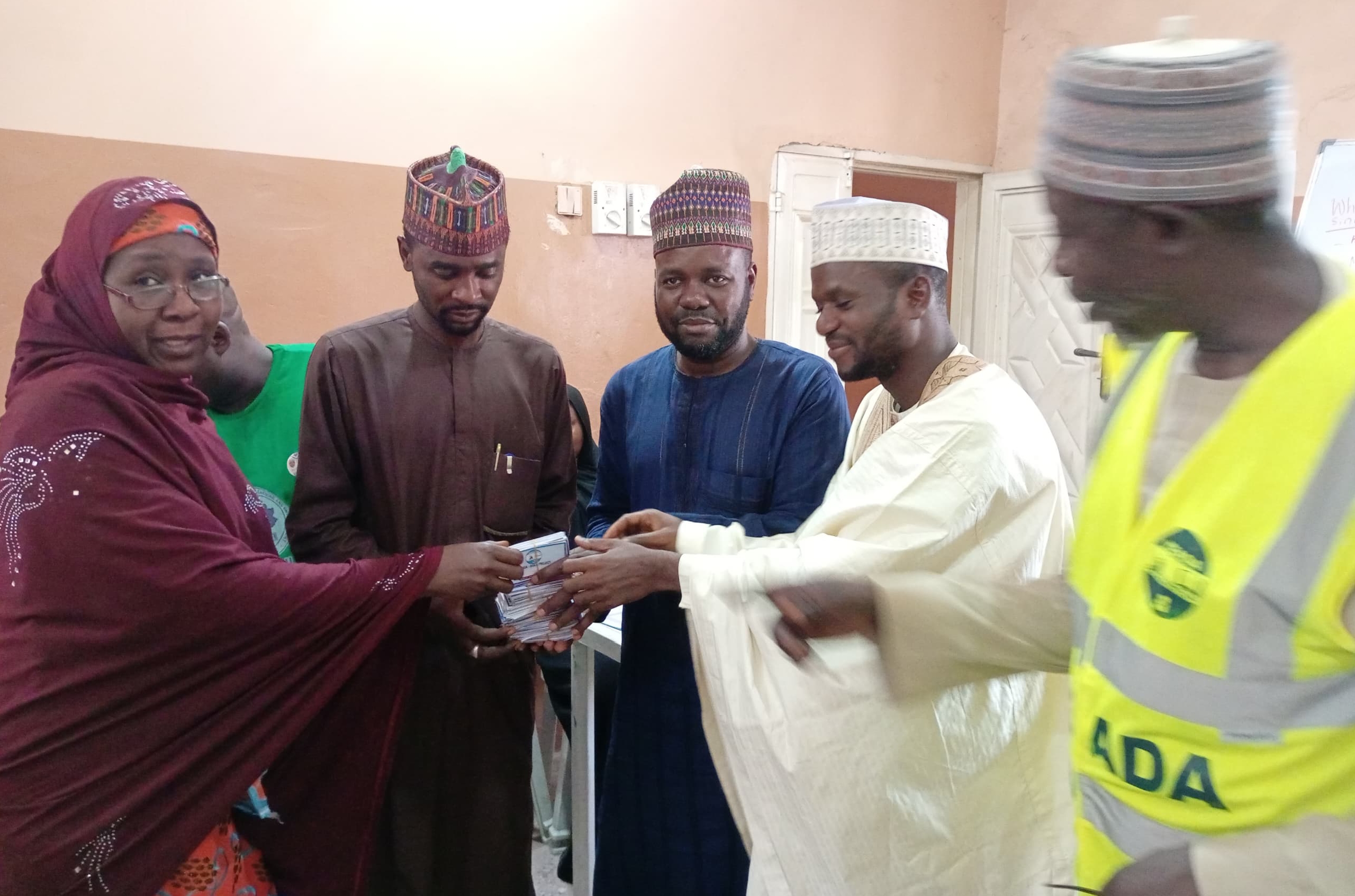
Aminu Abdullahi
The ICEADA AGILE partnership, aimed at promoting girls’ education at the grassroots level, has organized an Activity Feedback Workshop and Quarterly Meeting to assess the successes and challenges of the project across six local government areas in Kano State.
KANO FOCUS reports that the local governments areas include: Bebeji, Kiru, Karaye, Madobi, Rogo, and Warawa.

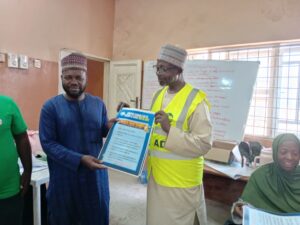
Prof M. B Shittu presenting IEC materials to Nasiru Yusuf Ibrahim
Speaking at the event, Prof. M.B. Shitu, Team Leader and Project Manager, explained that the project was designed to engage key stakeholders in the selected local government areas to sensitize communities on the importance of enrolling girls in school.
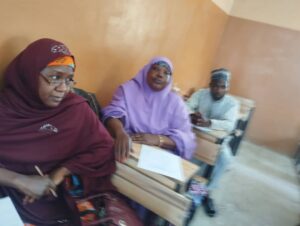
Cross section of ICEADA/AGILE mentors
He noted that participants of the workshop are Community Engagement Mentors selected from the six local governments.
“Their role is to engage directly with community members to promote girls’ enrollment in schools,” he said.
“Part of their responsibility is to carry out sensitization and mobilization campaigns within their communities. Our main concern is increasing the enrollment and retention of girls in secondary education. That’s why we introduced the Community Engagement Mentors—to collaborate with parents and local organizations in support of girls’ education,” Prof. Shitu added.
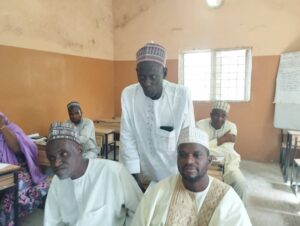
Cross section of ICEADA/AGILE mentors
He also revealed that the project has recorded significant progress across the six LGAs, although a few challenges still persist and are currently being addressed.
“One of the aims of this workshop is to review the activities carried out in the last quarter and set new community goals to strengthen our campaign. We’ve also launched house-to-house awareness campaigns to tackle the issues affecting girls’ education in these communities,” he stated.
Participants expressed satisfaction with the project’s progress. Lami Idris, a Community Mentor from Karaye LGA, shared her experience.
“We are going from house to house to educate people on the benefits of girls’ education. One of the major challenges we face is the lack of schools in some villages. Some girls have to walk long distances to reach school,” she said.
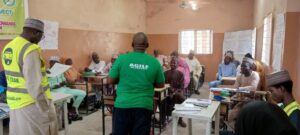
Review meeting in session
Abdullahi Balarabe Kiru, Secretary of the Nigeria Union of Teachers (NUT) in Kiru LGA, reported that data collected from the area showed over 40 girls are currently out of school. He affirmed that efforts are ongoing to address the issue.
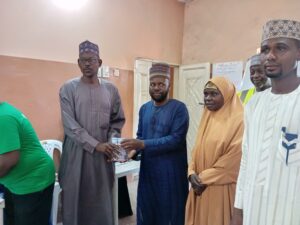
Nasiru Yusuf Ibrahim presenting IEC materials to community mentors
In his remarks, Malam Nasiru Yusuf Ibrahim, Communication Officer of the AGILE Project, disclosed that 130 new schools will be constructed in Kano State to tackle the problem of out-of-school children.
He also highlighted insecurity and the destruction of school infrastructure as major challenges facing the education sector.

Headlines
Governor Yusuf Distributes 10,000 Free JAMB Forms to Secondary Students

The Governor of Kano State, Alhaji Abba Kabir Yusuf, has inaugurated the distribution of 10,000 free JAMB forms to Kano secondary school students.
During the flag-off of the distribution, the Governor, who was represented by the state’s Commissioner of Education, Ali Haruna Makoda, also used the opportunity to inaugurate the training of the 10,000 beneficiaries on the use of computer-based tests at various designated centers across Kano State.
On his part, the Governor’s Special Adviser on Education, Alhaji Tajuddin Gambo, said the Governor has promised to provide transport for the beneficiaries throughout the training session and urged them to ensure they pass the examination.
He said the government is willing to select the best schools for the beneficiaries if they pass the examinations.
One of the beneficiaries of the 10,000 free JAMB forms, Fatima Mukhtar Umar, expressed gratitude to Governor Abba Kabir Yusuf for issuing the free JAMB forms and promised not to disappoint.

In a statement by Governor Abba Kabir Yusuf’s Special Adviser on Information, Ibrahim Adam, it was noted that the Governor used the opportunity to elaborate on the feats achieved by his government in developing the education sector in the last 22 months. These include the re-introduction of foreign and domestic scholarships, re-opening of 21 skills acquisition institutes, general renovation of primary and secondary schools, construction of new classrooms, provision of classroom furniture and writing materials, and the distribution of free uniforms to primary school pupils.
Other achievements, according to the Governor’s Special Adviser on Information, Ibrahim Adam, include the reduction of 50% of registration fees in state-owned tertiary institutions, cash conditional transfers to support girl-child education, and the settlement of registration fees for NECO, NABTEB, and NBAIS, to mention but a few.
Ibrahim Adam said Governor Abba Kabir Yusuf urged all the beneficiary students to make the best use of the opportunity and strive for excellence in their academic pursuits, saying that the future belongs to those who work tirelessly to turn dreams into realities.

Headlines
Exposed: Coercion Over Coalition?: Youth Forum Reveals Presidency’s Desperate Moves on Kwankwaso
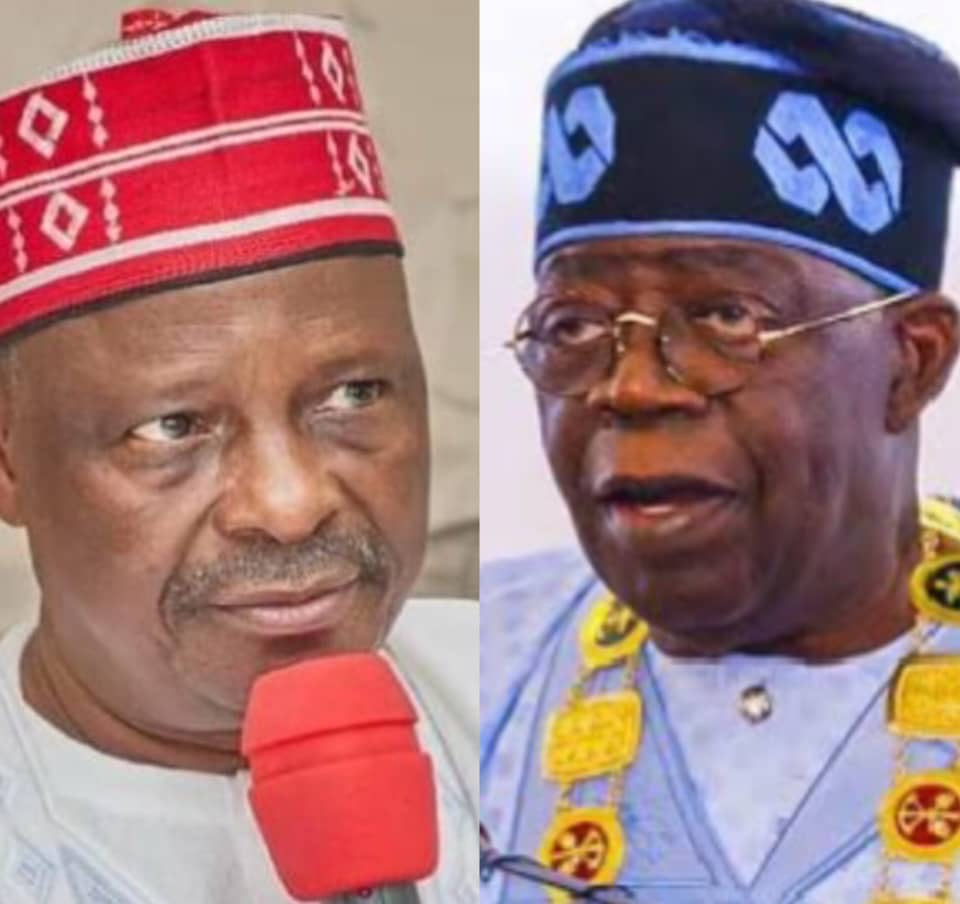
A political storm is brewing as the Coalition of Northern Youth Forum (CNYF), under the leadership of Alhasan Barau Gausu, has raised alarm over what it describes as desperate and undemocratic moves by the Presidency to force Dr. Rabiu Musa Kwankwaso, the national leader of the New Nigeria Peoples Party (NNPP), into joining the ruling All Progressives Congress (APC).
According to the group, the Tinubu-led administration is leveraging state institutions, particularly the Economic and Financial Crimes Commission (EFCC), to intimidate and coerce Kwankwaso into defecting to the ruling APC.
Central to the allegations is a revived petition detailing a 2016 contract worth N15.5 billion, awarded through the Federal Ministry of Water Resources to a company reportedly linked to one of Kwankwaso’s closest allies—a known financier of the Kwankwasiyya Movement.
The EFCC reportedly invited the contractor for interrogation last week Tuesday.

The CNYF claims that the contractor is being pressured to implicate Kwankwaso in the alleged financial misconduct, suggesting the anti-graft agency is being used as a political weapon to break the opposition.
“This is nothing short of blackmail,” said Gausu. “They want to silence Kwankwaso’s rising political influence and force him into a weak alliance with the ruling party, using fear and intimidation.”
The group further disclosed that a high-powered delegation from the Presidency, led by a former Katsina State governor—now serving as TETFUND board chairman—recently visited Kwankwaso at his Abuja residence, appealing to him to join the APC.
However, sources say Kwankwaso responded with firm conditions for any possible defection.
These include:
• A reduction in the price of Premium Motor Spirit (PMS)
• Massive reinvestment in Nigeria’s education sector
• Reintroduction of the Almajiri Model Education System (originally implemented during President Jonathan’s administration)
• His appointment as Secretary to the Government of the Federation (SGF)
Allocation of three ministerial slots to his political associates from northwest, northeast and south-south.
Without these demands being met, Kwankwaso reportedly stated he would remain with the NNPP—or align with the emerging SDP coalition, being championed by Atiku Abubakar and Nasir El-Rufai.
The fallout from this meeting, according to the CNYF, may have prompted APC National Chairman Abdullahi Ganduje’s recent public declaration that Kwankwaso would soon rejoin the APC.
Speaking during a visit by the Tinubu Support Group (TSG) to the APC national secretariat, Ganduje boldly claimed, “NNPP is dead,” insinuating that its leader was on the verge of returning to the ruling party.
Analysts believe the APC’s desperation stems from Kwankwaso’s undeniable grassroots influence in the Northwest—especially Kano State, which boasts over two million registered voters.
With growing public discontent over the removal of fuel subsidy and other economic policies, the Tinubu administration appears to be seeking strong political alliances ahead of 2027.
But for now, Kwankwaso remains unbowed, standing firm on his conditions and signaling that the NNPP—and its ideals—are not for sale.
Recently, the national and Kano state chapter of the APC were directed by the powrful forces from the villa to galvanize support and provide receptive atmosphere to recieve Kwankwaso and his teaming supporters back to APC.













